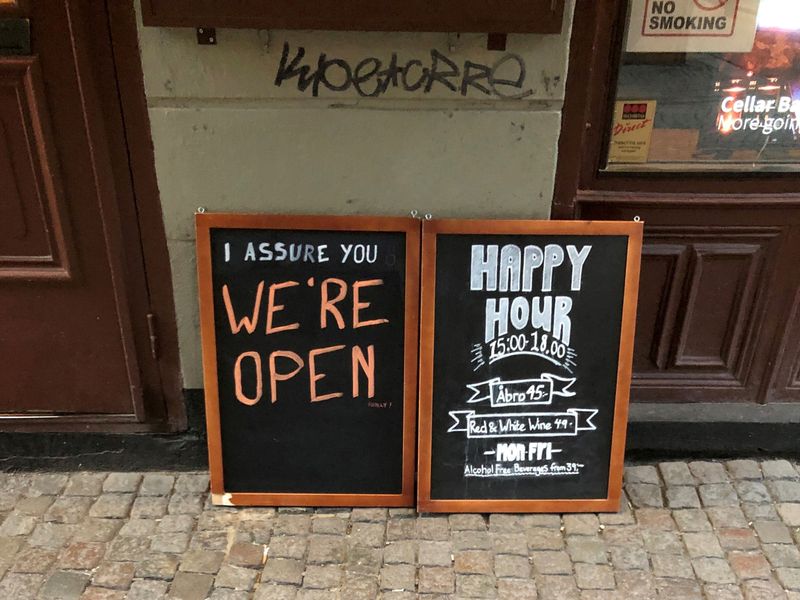STOCKHOLM (Reuters) – Per Arne Fredin has been at the sharp end of Sweden’s policy to buck the norm and avoid a COVID-19 lockdown – a decision that has been hailed as both visionary and irresponsible by public figures around the world.
As a 70-year-old with a heart condition, he was in a danger group for the novel coronavirus. He feared the worst when he was diagnosed with COVID-19 in February, but pulled through after 12 agonising days in bed at home to the west of Stockholm.
Fredin is also the owner of a trucking business, which too has survived the pandemic thus far – which he attributed in large part to the government’s decision not to institute a lockdown, in contrast to its Nordic neighbours, most of Europe and much of the world.
He has been able to retain his 80 workers at his firm, Grodinge Transport. His fleet of 65 trucks has mostly made up the business lost from collapsing aviation-related work thanks to increased demand for deliveries of food and medical supplies.
“It’s meant a tremendous deal for us that the Swedish government has acted the way it has. One of my drivers sent a picture from an autobahn in Germany and it was completely empty, ghost-like,” he said.
“I have most of my life behind me,” he added. “There will come a day after this, and we have to think about those that need to carry on living.”
PUBLIC TRUST AND PROTESTS
Sweden has kept most schools, restaurants and businesses open, and relied primarily on voluntary measures to fight the virus. Swedes have been asked to keep social distance, work from home where possible, and avoid travel.
“I feel confident in the overall strategy. One reason that we have chosen this strategy, and where we have supported the agencies, is that all measures have to be sustainable over time,” Prime Minister Stefan Lofven said last week.
Some Swedish scientist have however accused the government of running a dangerous experiment with people’s lives and urged it to implement lockdowns like those in neighbouring countries.
The chosen path may seem extreme, but debates about the balance between public and economic health – or if the two can be separated – are taking place around the globe as countries calculate how best to extricate themselves from shutdowns.
The death tolls so far offer little clarity, however.
The outbreak has killed almost 2,600 people in Sweden. While that is far more relative to the size of the population than in Denmark, Norway and Finland, where authorities have taken a stricter approach, it is lower than in Britain, France and Spain where there have also been lockdowns.
While it is unclear why Sweden’s death rate has been lower than some countries, one reason could be that the population is more spread out – more than half of homes are single-person households, easily the highest proportion in the EU, according to 2016 figures from the bloc’s stats office.
Another factor that has been cited is that Swedes’ trust in government ranks high internationally. They were second in the European Union, after the Netherlands, in a survey published by the European Commission in 2017, with 72% trusting their government, compared to the EU average of 40%.
This could mean a coronavirus containment strategy that relies on voluntary measures might not be effective elsewhere.
In some countries, including Germany and the United States, there have been protests against lockdown measures.
SO HOW IS ECONOMY HOLDING UP?
Regardless of domestic decisions, the global slump will batter Sweden’s export-dependent economy, which the government expects to contract 7% this year.
JP Morgan has forecast Sweden’s economy will contract less than the euro area, with a 2.4% contraction in the first quarter of this year and a 13.7% percent contraction in the second.
That compares with projections of a 4% and 17.3% contraction for the euro area; 3.1% and 16.6% for Germany; and 4% and 21.4% for France, according to the bank’s report published on Friday.
Sweden’s strategy appears to have softened the blow for some sectors.
“The actions that the Swedish government has taken are good and it perhaps makes the performance of Sweden’s economy less bad than other economies,” said Jens Henriksson, CEO of Swedbank <SWEDa.ST>, Sweden’s biggest mortgage lender.
“And that is good for the banking system.”
Statistics from rival SEB <SEBa.ST> showed card transactions made through the bank fell by 28% in Sweden in the week of April 6, much less than the 70% in Finland and the 66% in Denmark.
Similarly, while central bank data showed daily restaurant turnover tumbled 70% in Sweden in the month through April 22, that compared with near-100% falls in Germany and Britain.
‘WE’RE NOT AT END OF JOURNEY’
Sweden’s tactics have not focused on stopping the disease, which is seen as unrealistic by its health agency, but to slow it enough that the healthcare system can cope, while keeping society and the economy running as much as possible.
The strategy received cautious backing from the World Health Organization on Wednesday.
“If we are to reach a ‘new normal’, in many ways Sweden represents a future model,” said Mike Ryan, the WHO’s top emergencies expert.
But he also pointed to Swedes’ faith in authorities, adding: “What it has done differently is that it really, really has trusted its own communities to implement that physical distancing.”
Sweden could reap a longer-term benefit if “herd immunity” is achieved faster there than elsewhere. However this concept, where enough people have been infected to effectively stop the virus spreading, is untested for the new disease.
The Swedish health agency’s modelling suggests about 25% of people in the Stockholm region have had or will contract the disease, levels at which it has said partial herd immunity could help slow the outbreak.
By contrast, in neighbouring Finland, health authorities have been concerned the coronavirus has spread too slowly, leaving the country well short of their peak of infections.
COVID-19 survivor Fredin is mindful of the effect of a shutdown on the economy as well as long-term public health.
“I think the government has done a very mature and good job,” he said. “We’re not at the end of this journey and I think other countries will have to pay a heavy price further down the line.”
(Reporting by Johan Ahlander; Additional reporting by Colm Fulton, Anna Ringstrom and Johannes Hellstrom in Stockholm, and Stephanie Nebehay in Geneva; Editing by Niklas Pollard and Pravin Char)























